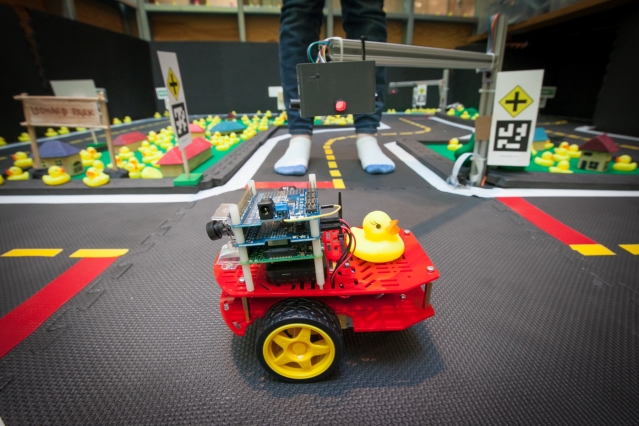The Massachusetts Institute of Technology (MIT) has offered classes on everything from “street-fighting math” to pirate training, but a new robotics course may truly sound a little quackers. Called “Duckietown,” experts built a miniature town with complex road junctions that’s home to up to 50 taxis “driven” by rubber ducks.

Going for a drive through Duckietown is anything but quackers. Image source: MIT.
Offered this spring semester, the hands-on course housed at MIT’s Computer Science and Artificial Intelligence Laboratory (CSAIL) is an important step in teaching future engineers to train self-driving vehicles to navigate a town. The mini taxis are fitted with cameras that allow them to read road signs and avoid crashing into obstacles.
As part of the project, students had to build a fleet of duck-carrying robo-taxis that use a single camera to navigate. Unlike Google’s experimental car, the duck-mobiles don’t rely on pre-programmed maps to find their way around a network of roads, but instead navigate without any clues in real-time.
Each taxi is equipped with an on-board computer that uses a computer vision algorithm to read road signs and QR codes, instructing them to stop, for example. It was up to the students to develop the algorithm, which is also capable of spotting “pedestrians” to combine different disciplines like control theory, machine learning, and computer vision into their systems.
In the video demonstration above, the duck-taxis seem to be aware of each other, with one car giving way to another at an intersection, and stay in lanes by reading road markings. While building the miniature town may seem costly, it teaches students about tracking and object detection. The researchers have even made their Duckietown program free to access for other students, and it’s hoped the experiment will lead to the next generation of autonomous vehicles.
Each duckbot costs $100 in parts to make. Beyond the class, Duckietown’s leaders have ambitions to work with roboticists around the world to incorporate their open-source teaching materials and design into other schools’ programs.
Source: robohub.org
Advertisement
Learn more about Electronic Products Magazine





